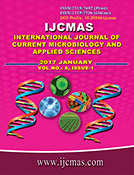


 National Academy of Agricultural Sciences (NAAS)
National Academy of Agricultural Sciences (NAAS)

|
PRINT ISSN : 2319-7692
Online ISSN : 2319-7706 Issues : 12 per year Publisher : Excellent Publishers Email : editorijcmas@gmail.com / submit@ijcmas.com Editor-in-chief: Dr.M.Prakash Index Copernicus ICV 2018: 95.39 NAAS RATING 2020: 5.38 |
Quinolones are among the most commonly utilized antimicrobials for treatment of infections caused by P. aeruginosa. Plasmid mediated quinolone resistance (PMQR) is an expanding clinical concern worldwide with fluctuating prevalence rates. Spread of PMQR determinants along with other resistance mechanisms to P. aeruginosa clinical isolates would constrain the adequacy of quinolones in treatment of Pseudomonas infections. This study was designed to investigate the incidence of PMQR determinants among nosocomial P. aeruginosa isolates. A total of 110 clinical P. aeruginosa were collected over a period from January 2012 to October 2015frominpatients in Al-Azhar University Hospital, New Damietta, Egypt. Testing of isolates for resistance to four quinolones was performed using Kirby-Bauer disc diffusion method. Multiplex PCR was carried out for screening of the eight PMQR genes(qnrgenes (A,B,C,D,S), aac(6´)-Ib-cr, qepA and oqxAB).Out of the 110 P. aeruginosa isolates tested, 47(42.7%)isolates were sensitive to the 4 tested quinolones while 63(57.3%) were resistant to one or more of them. Testing of isolates for PMQR genes showed that 5(4.5%) harbored qnr genes, 2(1.8%) were qnr B positive and 3(2.7%) were qnr S positive. Isolates were negative for the other tested PMQR genes. Generally, there is no statistically significant association between quinolone resistance and the presence of PMQR genes. This study highlighted diverse PMQR genes and their prevalence among P. aeruginosa isolates. The complex epidemiology of PMQR strains needs to be further studied in order to design measures to control their spread.
 |
 |
 |
 |
 |